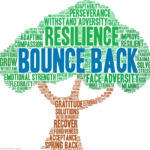The other conception of hope that we often consider is that it is blind optimism, but I would contend that authentic hope is tempered by realism. As rheumatologists, we are painfully aware of the limitations of our treatments, the unpredictable nature of systemic autoimmune rheumatologic diseases and the challenges of chronic pain. Yet we continue to hope because we possess the power of perseverance. And sometimes, it’s that hope we carry for our patients that strengthens their own resilience, a gift we pass back and forth.
3. Fostering Hope
With all that said, can we grow our ability to hope? This might sound like a simple question, but nurturing hope is an ongoing process, one that requires dedicated practice and intention. As rheumatologists, fostering hope means seeking out and moving toward what gives us energy and joy. Sometimes, that’s a scholarly project that excites us, a mentor or mentee who grounds us or even a hobby totally outside of medicine that reconnects us with life beyond the clinic. Hope thrives when we are not solely consumed by the negative aspects of our professional lives, but are also invigorated by a sense of personal purpose and curiosity.
To foster hope, we need to zoom in on and very deliberately celebrate progress—even when it’s small. The scientific advancements that brought us targeted biologics, precision medicine and innovative pain management techniques all started with almost imperceptibly small, incremental steps. In the same way, we can foster hope by acknowledging each improvement, each sign of progress in a patient’s health or each bit of knowledge gained. These acknowledgments add up, reminding us that our efforts, however gradual, are moving us forward.
Consistency is also critical to building that sense of hope. Admittedly, it’s easy to lose sight of hope in the face of demanding schedules, difficult cases and the slow progress inherent in chronic disease management. Like most people I have felt at rock bottom without any hope left at times. Yet with the help of friends, family, and colleagues, I have been able to cobble together the small reasons for hope in something that brought me back to a more hopeful and joyful place. Just as Stella and I venture out on our evening walks regardless of the weather, we must keep moving forward with hope as our guide, even on the darkest of days.
4. Sharing Hope
In addition to the deliberate practice of generating hope, it’s imperative that we share hope with others, especially those who are encountering difficulty in finding it. This is especially important to those working in healthcare, a setting in which we often become bearers of heavy emotional and physical burdens.



